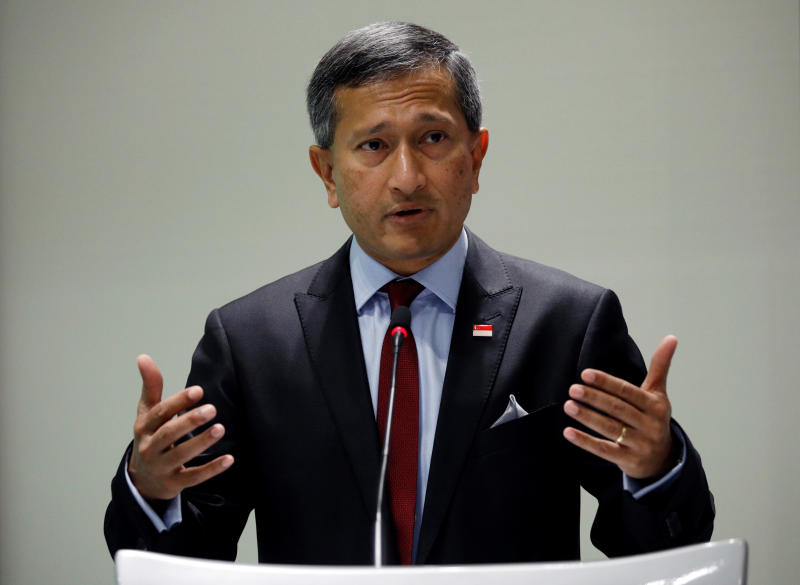Singapore not joining US, Japan-led free and open Indo-Pacific for now: Vivian Balakrishnan
Sign up now: Get ST's newsletters delivered to your inbox

Foreign Minister Vivian Balakrishnan said that Singapore, as a small country, believes in multilateralism, the rule of law, and peaceful dispute resolution.
PHOTO: REUTERS
Follow topic:
SINGPORE - Singapore will not be signing on for now to the free and open Indo-Pacific strategy being touted by the United States, Japan, India and Australia, said Foreign Minister Vivian Balakrishnan at a lecture on Monday (May 14).
Asked if Singapore would join "the Quad" of four countries, he replied that the strategic concept does not adequately address whether Asean would continue to be central to the region's architecture, and whether multilateralism and the rule of law would remain the order of the day.
Some have seen the free and open Indo-Pacific bloc as a competitor to Asean and a way to counter China expansionism, though US and Japan officials have called Asean a core part of the strategy.
Japan and the US, the two key leaders of the strategy, see it as a way to promote high-quality infrastructure and freedom of navigation in the region amid concerns over China's increasing assertiveness, though details remain nebulous.
Dr Balakrishnan said the strategy must also benefit South-east Asia's economy and help local companies "make it into the big league".
"Frankly right now, the so-called free and open Indo-Pacific has not yet fleshed out sufficient level of resolution to answer these questions that I've posed... We never sign on to anything unless we know exactly what it means," he said.
Dr Balakrishnan was answering questions from the audience of 100 diplomats and academics at his lecture titled "Asean: 2018 and beyond". It was part of the International Institute for Strategic Studies (IISS) Fullerton lecture series.
Moderator and IISS senior fellow William Choong asked if Singapore, which is chairing Asean this year, will be drawn into "the Quad" of countries currently forming the Indo-Pacific strategy.
The minister replied that Asean must be central and have speaking rights and the ability to make decisions in any free trade arrangement, be it China's Belt and Road Initiative (BRI) or the free and open Indo-Pacific strategy.
"Otherwise we become divided, or people just ride over us and we have no say," said Dr Balakrishnan.
The minister also stressed that Singapore, as a small country, believes in multilateralism, the rule of law, and peaceful dispute resolution.
"If big powers are going to insist on settling things through bilateral negotiations, on what basis are you going to settle the outcome? Might is right? We want a rules-based multilateral system," he added, without referring to specific countries.
US President Donald Trump has repeatedly expressed a preference for bilateral trade deals over multilateral ones.
In his lecture, Dr Balakrishnan listed one of Asean's key challenges as maintaining its relevance and unity amid the rise of powers such as China and India.
South-east Asia has long been a vital channel for goods, and as a result "has always been exposed to the tidal pulls of increasing economic, and therefore strategic, competition among the major powers," he said.
"The key challenge, knowing we are a traffic junction, is whether we can maintain our relevance and unity, or whether everyone just rides roughshod over us," he said.
Other challenges include cybersecurity, global anxiety over free trade and rapid advances in technology.
When asked how Asean will fit into the free and open Indo-Pacific concept, Dr Balakrishnan replied that the concept and others like China's BRI, if properly envisioned and carried out, can coexist and benefit all in South-east Asia.
"South-east Asian countries do not want to be forced into making false choices or forced choices. We believe in being open and inclusive and that therein lies the road to prosperity. We'll wait and see," he said.

